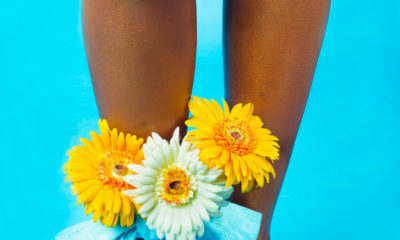Features
Meet Gloria Odukoya – a Shoemaker Making Her Footwear Affordable for the Average Nigerian
Most persons think I’m not capable enough because I’m a female. They just look at me and say, ‘Oh, she’s a lady, would she be able to give us that quality we need?’
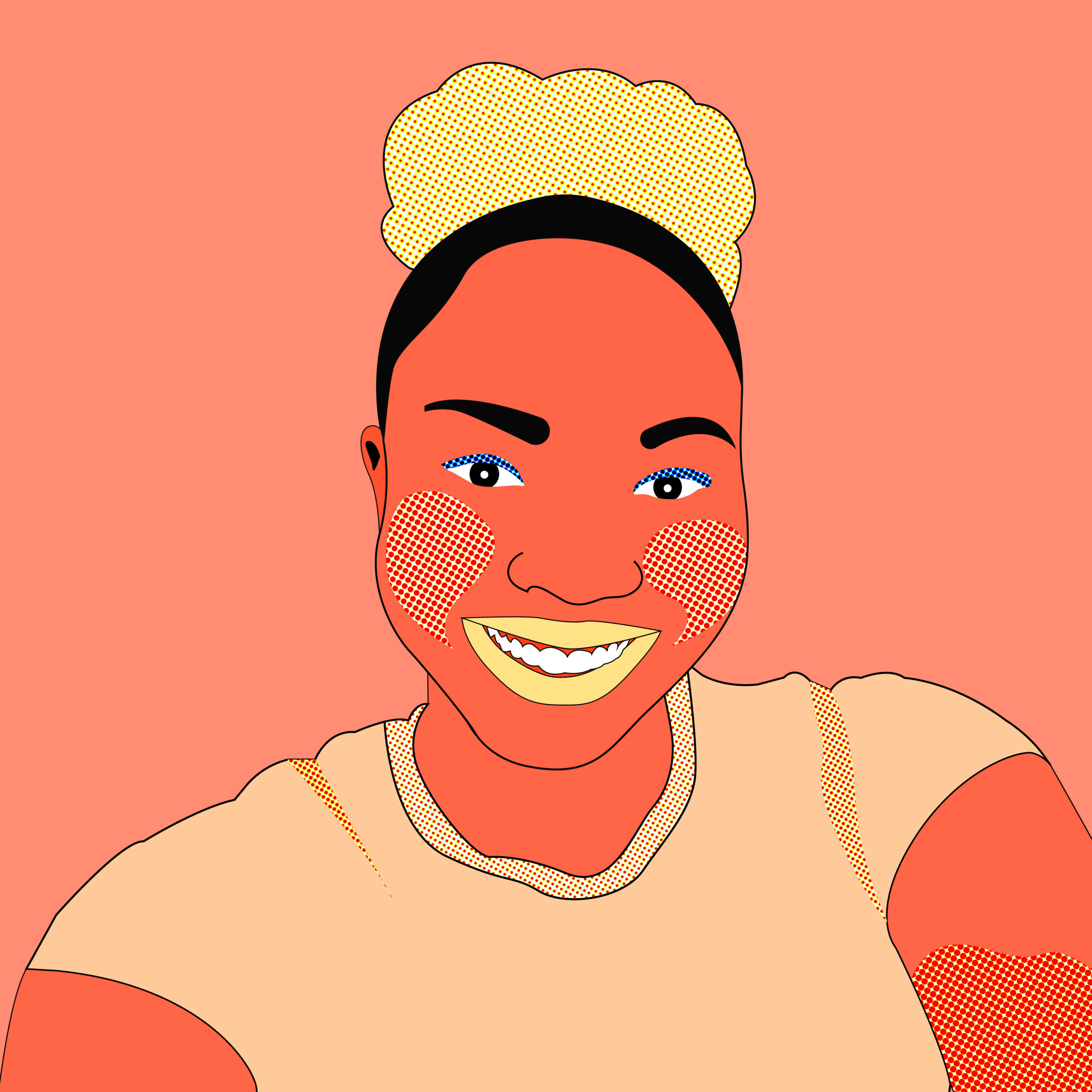
Immediately after Gloria Odukoya graduated from the University of Ilorin in 2022, she knew she wasn’t going to join the job search market. So while in school, after lectures, Gloria busied herself with learning shoemaking, a profession conventionally reserved for men. She knew she was good enough to establish herself.
Growing up, Gloria’s mother always wanted her to learn a skill as the first child, hoping it would complement her education. At first, she tried to learn makeup as it was the trending skill at the time, but she didn’t develop any interest in it and stopped after a few weeks. She then tried learning hair making, an experience she described as her “worst.”
When she got to 200 level in the university, she fell in love with handmade slippers, and often spent extra money buying them. But when she noticed her friends always wanted the exact designs, she took them to Motion Ground, a small market hub inside the University of Ilorin, to buy the slippers. One day, it dawned on her that if she learned the shoemaking skill, her friends could buy directly from her instead.
When she spoke to Alfa, the man producing the slippers, he didn’t take her seriously at first, saying she was a woman and many students had come with similar intentions but never followed through. Determined, she asked him how much it would cost to train and, fearing to bother her mom due to past failed learning experiences, paid with her monthly allowance. Every day, after her classes, she would go to Alfa’s place where he taught her under a tree.
During the pandemic, Gloria showed her mom a few things she had made, who then suggested she finds an advanced shoemaker to continue her training.
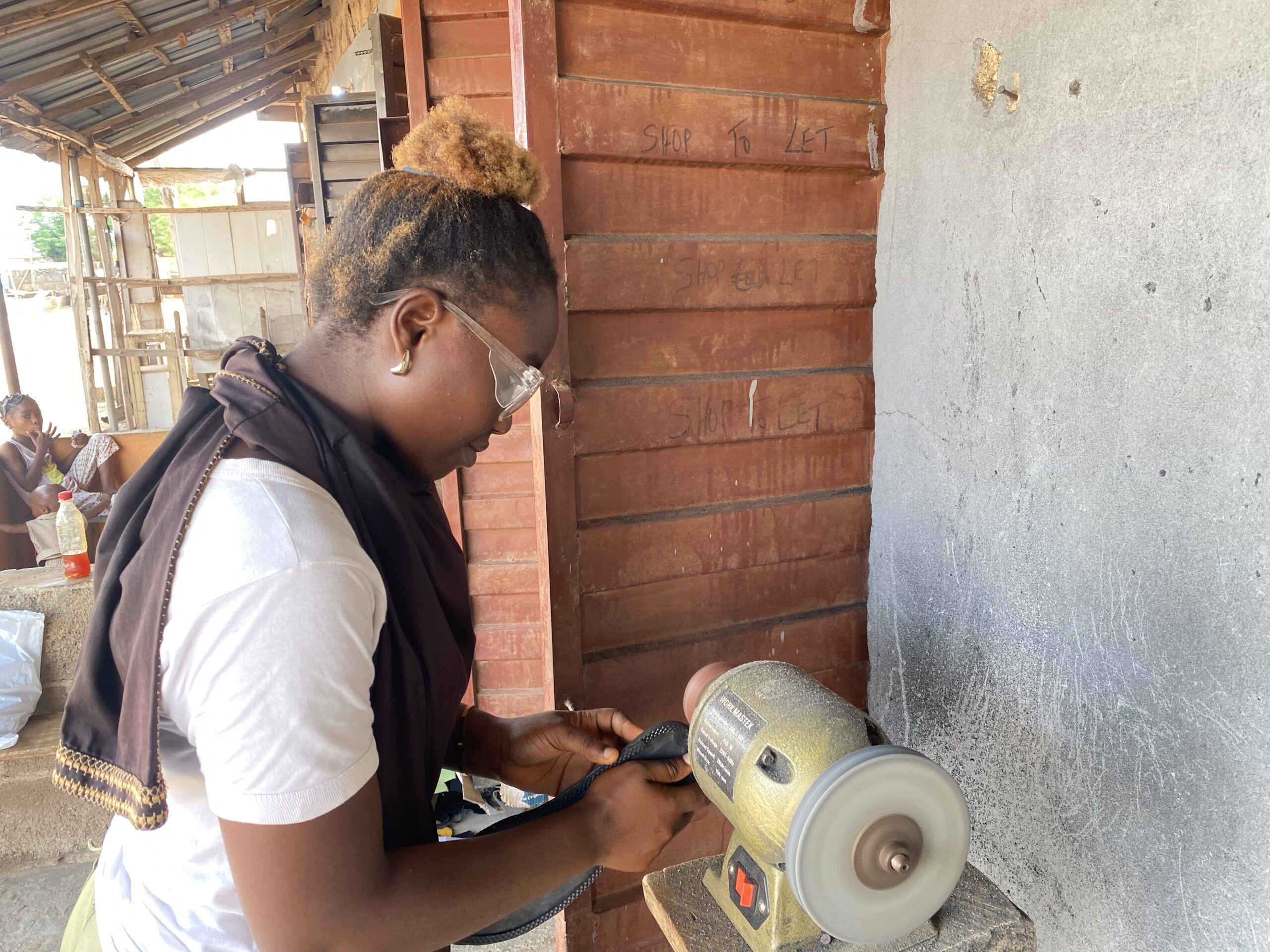
Gloria Odukoya working. Photo by Ahmad Adedimeji Amobi
Establishing Glowria Soles
In early 2023, Gloria decided to get a shop at the entrance of her estate in Ikorodu, Lagos. This was where Glowria Soles began as a business.
“I grew the shop gradually. I bought new equipment and materials like a sewing machine, showcasing glass for footwear, and some other tools. The business was growing and I was ready and happy to continue.” But after five months, the omo onile in Lagos asked her to start paying a ridiculous amount of money or vacate the space. “That was one of the challenging times of the year. I felt cheated,” Gloria said. She decided to go for the National Youth Service Corps (NYSC), where she hoped to eventually continue her business.
In June 2023, Gloria arrived in Osogbo to serve as a school teacher in a primary school. At the NYSC lodge she was staying at Power Line, she found a shoemaker who allowed her to use his pieces of equipment for her business. At school and different gatherings, Gloaria introduced her business to everyone. Initially, no one took her seriously but when she started posting the footwear designs she made for herself, she got patronised.
“I think I even get more customers now because I’m a lady and they are curious to know what a lady can do. Most of my customers are men and I love making men’s footwear more because it’s easier to make.”
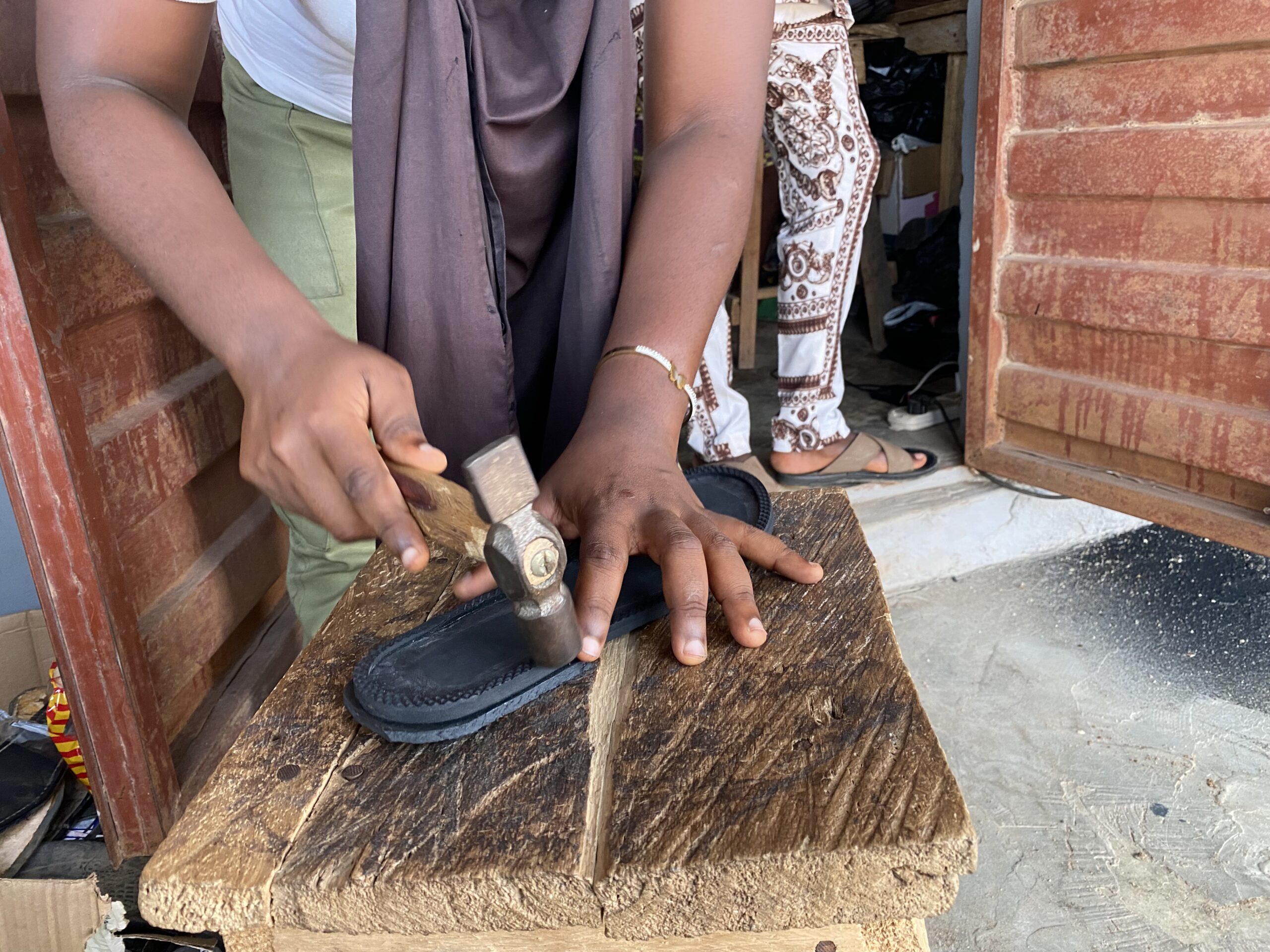
Gloria Odukoya working. Photo by Ahmad Adedimeji Amobi
Societal Reaction
Shoemaking has conventionally been considered a skill reserved for men. However, in recent times, women have increasingly taken an interest in and pursued this craft. Despite their growing presence and expertise in the industry, female shoemakers often face scepticism and gender-based challenges.
The shoemaking industry in Nigeria is expected to grow annually by 8%, and in recent times, the industry has witnessed an influx of women shoemakers. In 2020, Winifred Azuka fell in love with shoemaking during her NYSC from the Skill Acquisition and Entrepreneurship Department (SAED). Afterwards, it became difficult to secure a training place, but she was selected for The Footwear Academy training program in Aba. Despite being certified and skilled enough, she was largely considered to be unskilled.
“Most persons think I’m not capable enough because I’m a female. They just look at me and say, ‘Oh, she’s a lady, would she be able to give us that quality we need?’ So they just look down on me automatically,” Winifred narrated.
Like Winifred, Gloria is also tired of answering questions about her skill and competence. “People see me working and still ask questions. Like, are you the one producing the footwear? Obviously they can see I am, but they are not convinced. I am tired.”
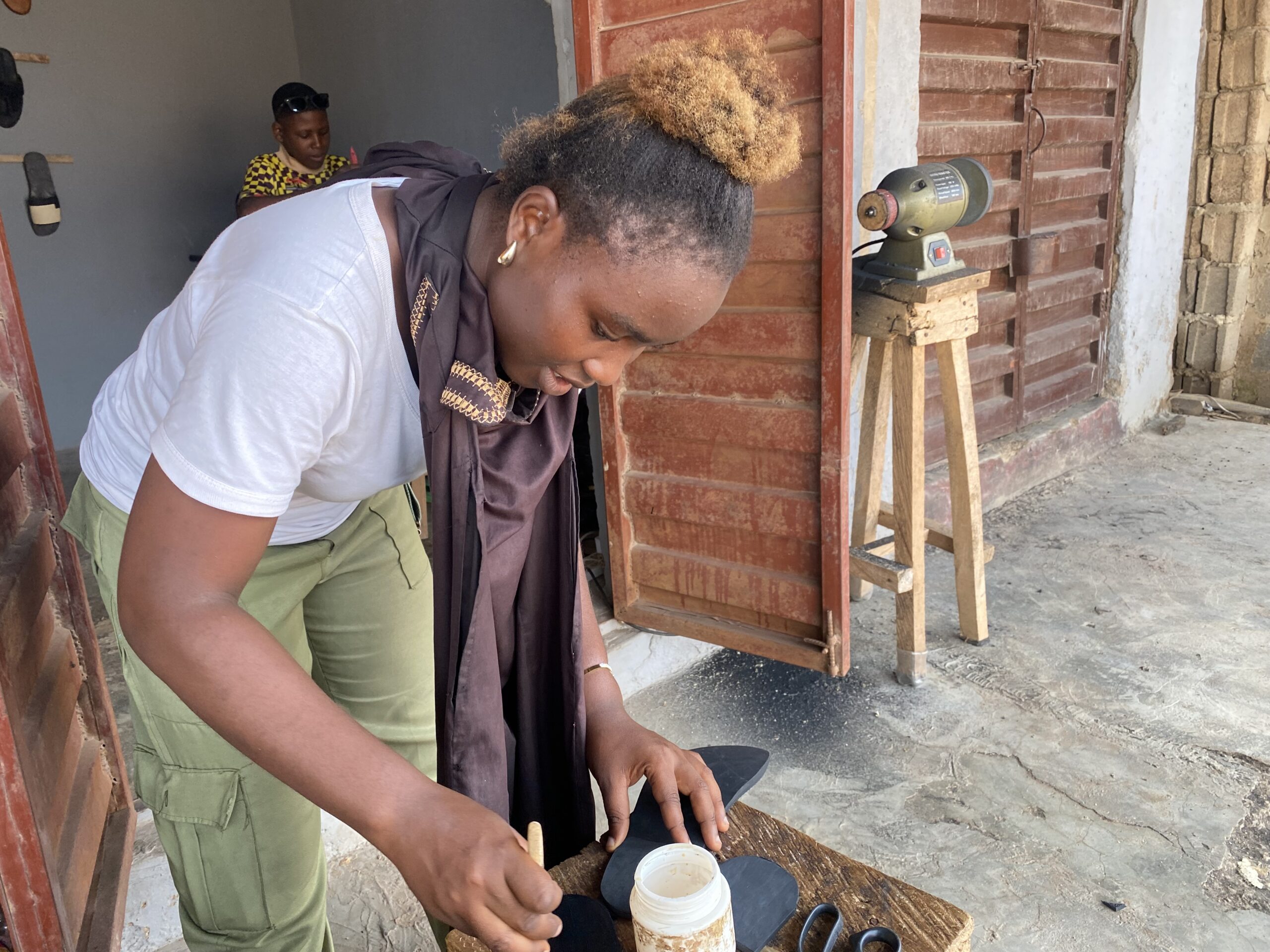
Gloria Odukoya working. Photo by Ahmad Adedimeji Amobi
Future Plans
Despite facing initial challenges, Gloria is determined to continue her business with the support of her mother and others. She plans to begin again in her immediate environment, aiming to build trust for her brand among the residents of Ikorodu. Her long-term goal is to expand her business throughout Lagos. Gloria’s vision is for her footwear to be accessible to the average Nigerian, despite the current high prices. She also intends to focus on improving her branding and marketing efforts.
On average, she currently makes a profit of N50,000 to N60,000 monthly. She believes that with the right resources, she could earn triple more in half a month. “I worry that this business will not put me on my mates’ levels. It puts me below. I try other options but I still run back to it. I am passionate about it, but passion does not give you the money these days. But I still can’t leave it. I enjoy doing it because I enjoy how I feel when I’m doing it.”
Gloria hopes to grow Glowria Soles into a brand. “My sincere plan for the brand is for an average Nigerian to be able to afford my footwear even when things are on the high side. I also want to work so hard on my branding and marketing because I feel that’s one area where my business is lagging. I want to prove to Nigerians that we have quality footwear and we have creative hands here,” Gloria said.




